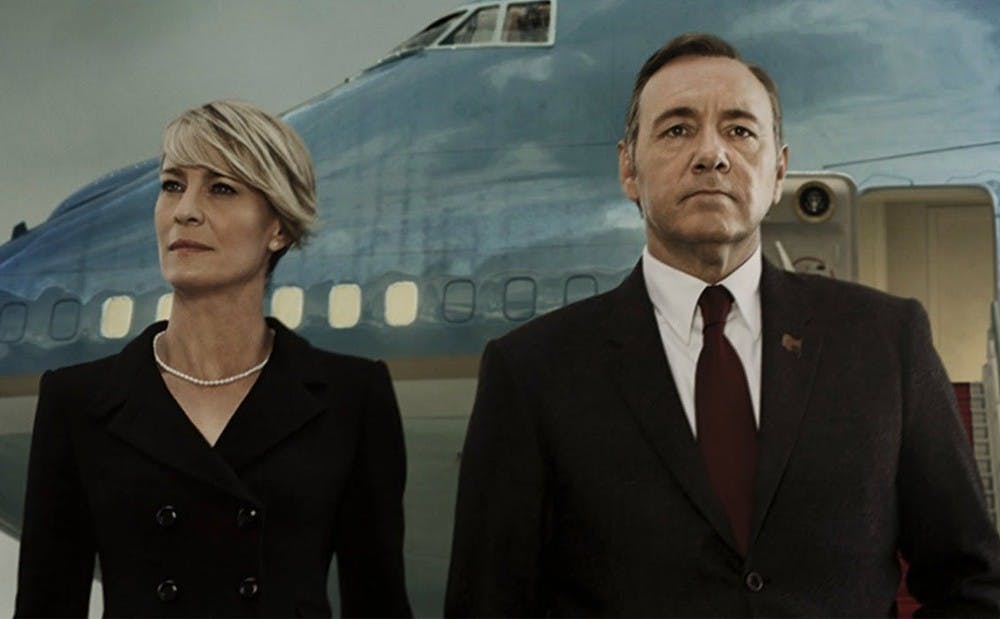It’s [insert late winter month], and you know what that means. That’s right, America’s scowliest, coldest, power hungriest family has returned. Put on a steaming pot of political opponents’ blood and keep the murders as quiet as possible. House of Cards season four is on the internets! Let’s get bingeing!
About that—if there’s one thing Netflix’s Frank and Claire Underwood understand, it’s ambition, so I’ll speak to you House of Cards diehards in the parlance of one of our country’s most enterprising politicians. Let’s dispel with the fiction that House of Cards season 4 is, in any way, worth your time. It is not. In fact, this year’s installment of Netflix’s prototype original series is sprawling, disgusting nonsense.
I know what you’re thinking. National treasure Kevin Spacey (President Frank Underwood)! Robin Wright (Claire Underwood)! David Fincher (executive producer)! But all of these fine professionals deserve better. They deserve to be a part of a show that establishes a coherent universe. One that doesn’t gross out its audience for no real reason at least once per episode. One with the occasional ray of sunshine. After all, constant darkness loses its effect after a while. Four years in, my eyes have adjusted. It turns out, there’s not much interesting going on under the ominous, ever-present Washington, D.C. clouds.
When we last encountered the Underwoods, the fiendish First Family had been cut to its acidic core. Claire, fed up with Frank’s opportunism, had abandoned our Anti-Hero in Chief in the cavernous, empty White House. But this intriguing thread fizzles in season four: Frank’s relationship with his first lady/ambassador turned out to be a relatively mundane arc, with the show rehashing familiar dynamics.
We meet several new frenemies this year, but, in typical House of Cards fashion, they offer little other than filler between Frank-Claire plotlines. Claire’s mother is predictably frigid. Frank’s potential general election rival is an uninteresting facsimile of “modern” politics. (He live streams tucking his kids in!) The nation is even confronted by an ISIS-esque terrorist group, Islamic Caliphate Organization, or ICO. When the show inevitably boils the group down to its individuals, it does so as deftly as one would imagine from a program in which the president is a murderer.
The familiar non-Frank-or-Claire characters are as boring as ever, too. Look me in the eye and tell me you still care about any of Doug’s story arc. Do you remember the specifics about oilman Raymond Tusk’s role in the show? Me neither, but he’s back this season! Even the year’s one genuinely interesting moment serves only to deprive us of two solid episodes of one of the show’s only momentum-providing figures. Also, Doug needs to die.
In theory, even a show with these flaws could be carried by the acting of Kevin Spacey and Robin Wright. But there are so many moments this season—and honestly, even season prior—that are gratuitous in their darkness. A sexual favor involving a car and an unsecured home firearm left me physically ill, and not in the cool, “Breaking Bad” way.
As I finished season four, I reflected on my decision to stick with “House of Cards” even this long. The show has been disappointing since season two, episode one—a frustrating web of meandering plot and and one-dimensional characters. But every year, I convince myself the show is worthwhile, bingeing each season’s thirteen episodes in quick succession. I’m always disappointed, but because 51 weeks separate each bingeing session, I inevitably forgive and forget. Don’t be like me. Don’t watch season four. I’ve already done it for you.
Get The Chronicle straight to your inbox
Signup for our weekly newsletter. Cancel at any time.

